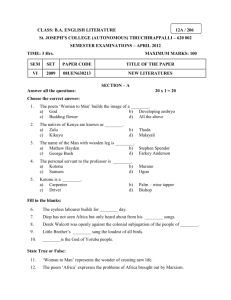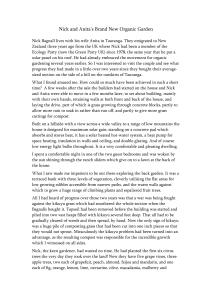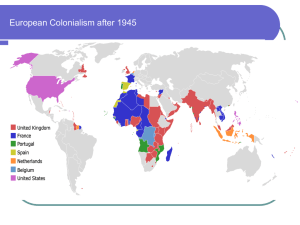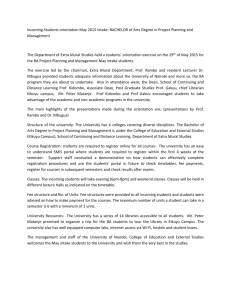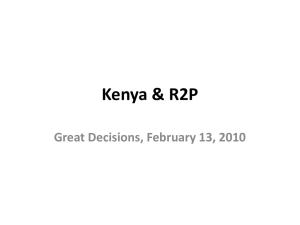Simulating Negotiations in a Three way civil war
advertisement
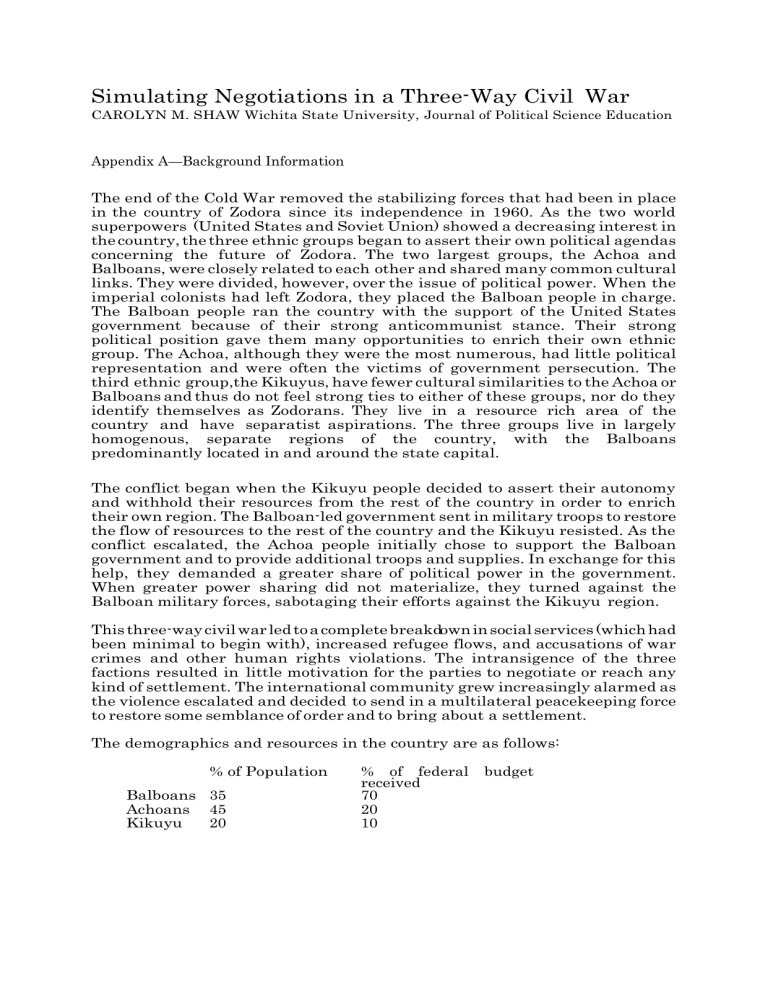
Simulating Negotiations in a Three-Way Civil War CAROLYN M. SHAW Wichita State University, Journal of Political Science Education Appendix A—Background Information The end of the Cold War removed the stabilizing forces that had been in place in the country of Zodora since its independence in 1960. As the two world superpowers (United States and Soviet Union) showed a decreasing interest in the country, the three ethnic groups began to assert their own political agendas concerning the future of Zodora. The two largest groups, the Achoa and Balboans, were closely related to each other and shared many common cultural links. They were divided, however, over the issue of political power. When the imperial colonists had left Zodora, they placed the Balboan people in charge. The Balboan people ran the country with the support of the United States government because of their strong anticommunist stance. Their strong political position gave them many opportunities to enrich their own ethnic group. The Achoa, although they were the most numerous, had little political representation and were often the victims of government persecution. The third ethnic group,the Kikuyus, have fewer cultural similarities to the Achoa or Balboans and thus do not feel strong ties to either of these groups, nor do they identify themselves as Zodorans. They live in a resource rich area of the country and have separatist aspirations. The three groups live in largely homogenous, separate regions of the country, with the Balboans predominantly located in and around the state capital. The conflict began when the Kikuyu people decided to assert their autonomy and withhold their resources from the rest of the country in order to enrich their own region. The Balboan-led government sent in military troops to restore the flow of resources to the rest of the country and the Kikuyu resisted. As the conflict escalated, the Achoa people initially chose to support the Balboan government and to provide additional troops and supplies. In exchange for this help, they demanded a greater share of political power in the government. When greater power sharing did not materialize, they turned against the Balboan military forces, sabotaging their efforts against the Kikuyu region. This three-way civil war led to a complete breakdown in social services (which had been minimal to begin with), increased refugee flows, and accusations of war crimes and other human rights violations. The intransigence of the three factions resulted in little motivation for the parties to negotiate or reach any kind of settlement. The international community grew increasingly alarmed as the violence escalated and decided to send in a multilateral peacekeeping force to restore some semblance of order and to bring about a settlement. The demographics and resources in the country are as follows: % of Population Balboans 35 Achoans 45 Kikuyu 20 % of federal received 70 20 10 budget Appendix B—Role Playing Assignments Kikuyu Faction Role You are a Kikuyu community leader who is seeking to protect his/her people and secure a better future for them. Your people are fighting the Achoa and Balboans to achieve greater regional autonomy, if not outright independence. You have few cultural or ethnic ties to the other two factions and blame the decolonization process for the arbitrary boundaries that included your region in the territory of Zodora. (The Kikuyu represent approximately 20% of the total Zodoran population). Negotiating Issues / Stance The rich natural resources of your region have been exploited by the central government (controlled by Balboans) for many years. Despite repeated efforts to see some of the revenues returned to your region, the central government has been unresponsive to such requests (government expenditures in the Kikuyu region are approximately 10% of the total). The lack of revenue has led to an inability to provide even basic services for much of the population, including funding for primary schools, rural health care clinics, safe drinking water, and agricultural assistance. In addition to these economic grievances, your people have also been denied basic civil and political rights. Many have been denied the opportunity to register and vote in national elections, some have even faced physical abuse when attempting to run for office. The Achoa have similar grievances against the central government, but you do not have many close ties to these people and this region. You believe the best solution to your economic and political difficulties is to gain independence from Zodora, however, you might consider other arrangements if certain rights can be guaranteed in the future. Attitude Toward International Mediators You welcome the international attention that the presence of foreign mediators brings to the conflict. You believe the principle of self-determination and your justifiable grievances will put the international community on your side and that they will help you against the unjust policies of the Balboans. Current situation The Balboan military has superior numbers and armaments but has not been able to counter the guerrilla tactics used effectively by the Kikuyus. The Balboan commanders recognize the considerable loses they have taken but believe they can still win the battle against the Kikuyu (and subdue the Achoa once the struggle for secession is put down). Several recent battles have taken place within villages and towns in the Kikuyu region as the Balboan forces have attempted to root out the elusive Kikuyu forces, but the Kikuyu show little willingness to stop fighting. The Achoa continue to harass Balboan forces but have avoided prolonged engage- ments. The Achoa have also taken advantage of the chaotic environment to conduct raids into Kikuyu territory. Consider your own faction’s interests and priorities. Try to reach a settlement with the other factions to end the fighting. You may begin with a simple cease-fire, or move directly to negotiating a comprehensive peace settlement. You may make requests of the international community to try to achieve an optimal outcome for your people. Appendix B—Role Playing Assignments Achoa Faction Role You are members of the Achoa faction that is fighting the Kikuyu and, more recently, the Balboans to prevent Kikuyu secession and Balboan dominance. Negotiating Issues / Stance You have cultural ties to the Balboans but have been systematically excluded from politics and economic development projects since decolonization 40 years ago despite a number of Balboan promises for greater inclusion. Although your people represent about 45% of the total Zodoran population (35% Balboan/20% Kikuyu), your region receives only 20% of the total government expenditures on such basic services as funding for primary schools, rural health care clinics, safe drinking water, and agricultural assistance. In addition to these economic grievances, your people have also been denied basic civil and political rights. Many have been denied the opportunity to register and vote in national elections, some have even faced physical abuse when attempting to run for office. The Kikuyu have similar grievances against the central government, but you do not have many close ties to these people and this region. You believe the best solution to your economic and political difficulties is to gain greater political freedom and equality within the Zodoran government. You are uncertain about granting Kikuyu independence because of the resources/ revenues that would be lost if it seceded. You might be willing to compromise on the issue of independence, however, if it could serve the interest of your people. Attitude Toward International Mediators You are generally supportive of the intervention efforts by the international community. You believe that as a majority of the Zodoran population you have justifiable grievances and you expect support from the mediators for your position. Current Situation The Balboan military has superior numbers and armaments, but it has not been able to counter the guerrilla tactics used effectively by the Kikuyus. The Balboan com- manders recognize the considerable loses they have taken but believe they can still win the battle against the Kikuyu (and subdue the Achoa once the struggle for secession is put down). Several recent battles have taken place within villages and towns in the Kikuyu region as the Balboan forces have attempted to root out the elusive Kikuyu forces, but the Kikuyu show little willingness to stop fighting. The Achoa continue to harass Balboan forces, but they have avoided prolonged engage- ments. The Achoa are the most war weary of the factions, facing shortages of basic supplies and services, but they have little trust for the Balboans since they failed to share political power after agreeing to early in the conflict. The Achoa have also taken advantage of the chaotic environment to conduct raids into Kikuyu territory. Consider your own faction’s interests and priorities. Try to reach a settlement with the other factions to end the fighting. You may begin with a simple cease-fire, or move directly to negotiating a comprehensive peace settlement. You may make requests of the international community to try to achieve an optimal outcome for your people. Appendix B—Role Playing Assignments Balboan Faction Role You are members of the Balboan government that is fighting the Achoa and Kikuyu uprisings in Zodora. Negotiating Issues / Stance When Zodora received its independence from the colonial powers, the Balboan people were trained in government service and entrusted with the well-being of the country. Successive Balboan presidents have overseen the economic growth and development of the country and worked hard to promote Zodora’s position in the international community. Many of the best educated Zodorans that run the political system and economy in the country are Balboan. The military is also staffed at the top by highly trained Balboan leaders. You do not believe the accusations of the Kikuyus and Achoa against the Balboan government are justified. You have managed the country well and have not cheated any region out of its share of revenues. You believe the most stable and strong political system is one in which only one party participates, so you have discouraged political competition in order to promote national solidarity. You are reluctant to agree to any calls for power sharing and shifting of revenues to other regions, and you are opposed to Kikuyu independence. However, you are under considerable pressure from the Balboan population to bring the war to a close even if it means making some compromises. Attitude Toward International Mediators You are distrustful of the motives of the international community. You are reluctantly cooperating to hold negotiations, but continue to stress the importance of Zodora’s sovereignty and note that the current instability is a domestic problem, not an international concern. Current situation The Balboan military has superior numbers and armaments, but has not been able to counter the guerrilla tactics used effectively by the Kikuyus. The Balboan commanders recognize the considerable loses they have taken but believe they can still win the battle against the Kikuyu (and subdue the Achoa once the struggle for secession is put down). Several recent battles have taken place within villages and towns in the Kikuyu region as the Balboan forces have attempted to root out the elusive Kikuyu forces, but the Kikuyu show little willingness to stop fighting. The Achoa continue to harass Balboan forces, but they have avoided prolonged engagements. The Achoa have also taken advantage of the chaotic environment to conduct raids into Kikuyu territory. Consider your own faction’s interests and priorities. Try to reach a settlement with the other factions to end the fighting. You may begin with a simple cease-fire, or move directly to negotiating a comprehensive peace settlement. You may make requests of the international community to try to achieve an optimal outcome for your people. Appendix B—Role Playing Assignments Diplomatic Mission Role You are members of a diplomatic team attempting to resolve the conflict in Zodora. Your chief negotiator is from a Western country that is viewed as largely neutral to the conflict. The diplomats have the moral backing of the United States as well as many other European countries that want to end the violence and establish a stable democratic government as quickly as possible. Negotiating Guidelines Your mediation team has the difficult task of trying to restore order in Zodora. Ideally you would like to get the parties to take steps toward a ‘‘self enforcing peace’’ by addressing the underlying sources of conflict. However, you may be only able to negotiate a cease-fire agreement between the combatants. As foreign diplomats you can offer certain incentives OR disincentives to the parties to gain their cooperation. Be creative, but realistic here. You have the resources and political support of most developed countries around the world, but remember that this support might not continue if extensive demands are made in terms of military support. (In other words, you should look for a diplomatic solution, but you may be able to draw on limited military resources to help implement it.) Mission Mandate To Be Determined—You may determine how expansive you want the mission to become and what you are willing to do based on the requests of the different factions. Current Situation The Balboan military has inflicted considerable damage on the Kikuyu military forces, but the Kikuyu show little willingness to end the conflict. The Kikuyu have adopted guerrilla tactics and have occasionally attacked Balboan villages on the border. There have been reports of atrocities during these attacks. The Achoa are the weariest of the consequences of the civil war, facing shortages of basic supplies and services, but they have little trust for the Balboans since they failed to share political power after agreeing to early in the conflict. Begin by establishing the positions of each of the factions and seek further negotiating points to determine under what conditions the sides will agree to end the conflict. Try to get the parties to negotiate specific details of a settlement: structure of government, division of territory and/or resources, protection of rights, etc. Appendix C—Situation Updates As the negotiations have proceeded with the three factions, the situation on the ground has shifted, altering the dynamics of the negotiation process. Scenario A Although the states bordering Zodora initially attempted to remain neutral in the conflict, two neighboring states have recently gotten actively involved. The country of Zania, bordering the Kikuyu region, has been helping the Kikuyu trade their natural resources for weapons. This has resulted in the Kikuyu being better armed. The Balboans see this cross border trading as an illegal syphoning of Zodora’s resources and potential revenue. The neighboring state of Tuku (bordering the Balboan region) has also gotten involved. The Tukus have committed 1,000 troops to the Balboan military command in fulfillment of the mutual security treaty that exists between Zodora and Tuku. The treaty was signed between the two countries in order to maintain regional stability and to maintain the power of the national governments. The Achoa have had no indication that the Balboans are willing to adopt any power sharing arrangement. They have, however, formed a relatively cooperative relationship with nearby Kikuyu villages, with both sides trading items necessary for survival in the conflict. Scenario B Although there is a tentative cease-fire in place in Zodora with international peace- keepers on the ground and in regular communication with the Zodoran government, the dynamics of the negotiation process are continually affected by changing popular opinion. Although the Balboan military has continued to place an optimistic spin on the conditions of the conflict and the likelihood of Balboan victory, the Balboan government is under increasing popular pressure to cut its losses. There have been increasing protests about the high number of casualties and several food riots in the markets. Recent polls indicate that 55% of the population would be willing to grant autonomy to the Kikuyu region, 20% would be willing to give the Kikuyu independence. Only 35%, however, would be willing to rewrite the Zodoran constitution to guarantee more equal representation for the Achoa. Scenario C In a recent series of offensive raids on Kikuyu villages, the Balboan military has succeeded in capturing the Kikuyu rebel leader and some of his top commanders. The Kikuyu guerilla attacks have been notably less organized and effective, and the general Kikuyu population appears to be demoralized. Given its recent successes in the Kikuyu region, the Balboan military has been repositioning its forces toward the Achoan region to put an end to the uprising there. Scenario D The Balboan military has often been thwarted by the guerilla tactics of the Kikuyu and has been increasingly taking out their frustrations on the civilian population. There are increasing reports of human rights abuses, and the international NGO Amnesty International has just uncovered evidence of a mass grave in a Kikuyu village recently occupied by the Balboan military. The Balboan government emphatically denies any misconduct by their military forces and accuses the international community of fabricating lies about human rights abuses. The Achoa region has not been immune from the increasing violence on civilian populations. Each act of sabotage against the Balboan military forces in Achoa has resulted in a harsh retaliatory strike against the nearby villages. Estimates of casualties range as high as 500 dead women, children, and elderly Achoans. Appendix D—General Directions for the Instructor . Provide Background Information and Role Assignments one class period in advance. . Give the following instructions to the students: You will be taking on the role of one of three factions involved in a civil war or of the international mediators that have intervened to try to bring peace and stability to the country of Zodora Read the description of your position carefully and try to take on your role as fully as possible. Be creative in your demands, proposals, and actions. You can make up material as long as it does not directly contradict the guidelines of your role. 1. Identify the essential elements of the relations between the three parties: alliances/conflicts/negotiable and non-negotiable issues/possible leverage etc Use a mind-mapping tool like wisemapping to help you : http://www.wisemapping.com/ 2. Prepare your demands 3. Prepare your proposals 4.Prepare any actions you demonstrations…) may want to take (eg. sabotage, raids,
